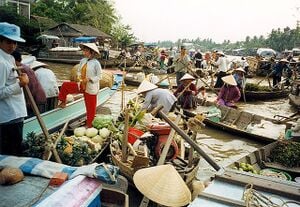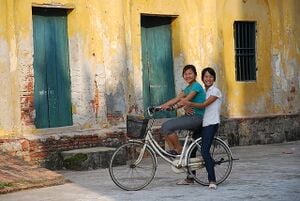
 We rarely hear about the disasters that were avoided – but there’s a lot we can learn from them, theconversation.com (Nov 23, 2023)
We rarely hear about the disasters that were avoided – but there’s a lot we can learn from them, theconversation.com (Nov 23, 2023)  Zimbabwe’s therapeutic ‘friendship benches’, coming to a city near you, positive.news (Jul 26, 2023)
Zimbabwe’s therapeutic ‘friendship benches’, coming to a city near you, positive.news (Jul 26, 2023)  Is it time to choose sustainable rice?, Wicked Leeks (Jul 17, 2023) — You might not know it, but traditional rice cultivation emits serious levels of greenhouse gases. Clare Hargreaves interviews a man working with rice farmers to get climate-friendlier rice onto British dinner plates.
Is it time to choose sustainable rice?, Wicked Leeks (Jul 17, 2023) — You might not know it, but traditional rice cultivation emits serious levels of greenhouse gases. Clare Hargreaves interviews a man working with rice farmers to get climate-friendlier rice onto British dinner plates. Vietnam records highest ever temperature of 44.1C, The Guardian (May 07, 2023)
Vietnam records highest ever temperature of 44.1C, The Guardian (May 07, 2023)
Networks and sustainability initiatives[edit | edit source]
- Xom Bac Cau on ecovillage.org, Community Garden, Education on Sustainable Development / Art Residency, added 15:27, 28 January 2023 (UTC)
Wetlands[edit | edit source]
Mekong[edit | edit source]
The Mekong or Mekong River is a trans-boundary river in East Asia and Southeast Asia. It is the world's twelfth-longest river and the third-longest in Asia with an estimated length of 4,909 km (3,050 mi) and a drainage area of 795,000 km2 (307,000 sq mi), discharging 475 km3 (114 cu mi) of water annually.From its headwaters in the Tibetan Plateau, the river runs through Southwest China (where it is officially called the Lancang River), Myanmar, Laos, Thailand, Cambodia, and southern Vietnam. The extreme seasonal variations in flow and the presence of rapids and waterfalls in the Mekong make navigation difficult. Even so, the river is a major trade route between Tibet and Southeast Asia. The construction of hydroelectric dams along the Mekong in the 2000s through the 2020s has caused serious problems for the river's ecosystem, including the exacerbation of drought.
Drought linked to a changing climate and dozens of hydroelectric dams are damaging the Mekong ecosystem. When drought ends and the inevitable floods begin, the effects of Mekong dams on flood pulse dynamics over the entire Lower Mekong are poorly understood.
Sewage treatment is rudimentary in towns and urban areas throughout much of the Mekong's length, such as Vientiane in Laos. Water pollution impacts the river's ecological integrity as a result.
Much of the 8.3 billion tonnes of plastic present on earth makes its way to the oceans. Ninety percent of plastic in the oceans is flushed there by just 10 rivers. The Mekong is one of them.
A growing number of academics, NGOs, and scientists have urged the international community and the Mekong River Commission to reduce the use of hydropower, giving concerns of long-term sustainability. Some of them have urged an immediate moratorium on new construction of hydropower projects and a shift to solar and other forms of renewable energy, which are becoming more competitive and faster to install.
Indochina mangroves[edit | edit source]
The Indochina mangroves are a large mangrove ecoregion on the coasts of Thailand, Cambodia, Vietnam and Malaysia in Southeast Asia.
Mangroves everywhere are vulnerable to clearance for logging and for agricultural development, and in this region have been particularly affected by the Vietnam War damage, particularly America's chemical weapon of defoliants, the Rainbow Herbicides, most notably Agent Orange which destroyed and devastated entire mangrove forests. In Vietnam there has been a post-war program of replanting to try and revive mangrove habitats.
Sustainable transport activism[edit | edit source]

The Mekong Delta and Red River Delta are vital to Vietnam's social and economic welfare – most of the country's population lives along or near these river deltas. The major cities of Ho Chi Minh City and Hanoi are situated near the Mekong and Red River deltas, respectively. The country's extensive network of rivers play a key role in rural transportation, with over 17,700 kilometres (11,000 mi) of navigable waterways carrying ferries, barges and water taxis.[1]
News and comment[edit | edit source]
2022
 Climate change in Vietnam: impacts and adaptation, The Conversation (Mar 08, 2022)
Climate change in Vietnam: impacts and adaptation, The Conversation (Mar 08, 2022)  Stand in the shoes of economic migrants - their current poverty, and the history that created it - and you might understand them better, The Alternative UK (Feb 01, 2022)
Stand in the shoes of economic migrants - their current poverty, and the history that created it - and you might understand them better, The Alternative UK (Feb 01, 2022)
2021
 Eco-community in Vietnam Building the New Normal!, ecovillage.org (Aug 11, 2021)
Eco-community in Vietnam Building the New Normal!, ecovillage.org (Aug 11, 2021)
2016
Vietnam to phase out coal, invest in gas and renewables, January 25[2]
About Vietnam[edit | edit source]
Vietnam, officially the Socialist Republic of Vietnam, is a country at the eastern edge of mainland Southeast Asia, with an area of about 331,000 square kilometres (128,000 sq mi) and a population of over 100 million, making it the world's fifteenth-most populous country. One of the two Marxist-Leninist states in Southeast Asia, Vietnam shares land borders with China to the north, and Laos and Cambodia to the west. It shares maritime borders with Thailand through the Gulf of Thailand, and the Philippines, Indonesia, and Malaysia through the South China Sea. Its capital is Hanoi and its largest city is Ho Chi Minh City (commonly known as Saigon).
Vietnam was inhabited by the Paleolithic age, with states established in the first millennium BC on the Red River Delta in modern-day northern Vietnam. The Han dynasty annexed Northern and Central Vietnam under Chinese rule from 111 BC, until the first dynasty emerged in 939. Successive monarchical dynasties absorbed Chinese influences through Confucianism and Buddhism, and expanded southward to the Mekong Delta, conquering Champa. During most of the 17th and 18th centuries, Vietnam was effectively divided into two domains of Đàng Trong and Đàng Ngoài. The Nguyễn—the last imperial dynasty—surrendered to France in 1883. In 1887, its territory was integrated into French Indochina as three separate regions. In the immediate aftermath of World War II, the nationalist coalition Viet Minh, led by the communist revolutionary Ho Chi Minh, launched the August Revolution and declared Vietnam's independence from the Empire of Japan in 1945.
See also[edit | edit source]
References

